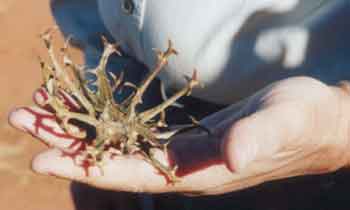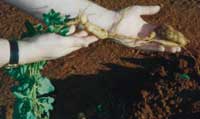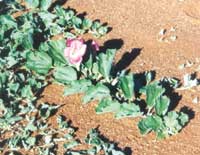Positive Health Online
Your Country

Devil's Claw - The Herbal solution to the North-South Divide?
listed in herbal medicine, originally published in issue 68 - September 2001
Devil's Claw for Back Pain
Every year in the UK 4,000 people bleed to death from perforated ulcers following long-term use of NSAIDS (non-steroidal anti-inflammatories). They are most widely prescribed for the pain and inflammation of arthritic conditions, but some (for example Ibuprofen and Brufen) can be bought over the counter and are used as super-strong headache or muscle ache treatment. The potentially fatal side effects of these drugs are of great concern to the medical profession in the West; and in France and Germany concerted efforts are being made to find alternatives. One such is Devil's Claw, and recent double-blind, prospective placebo-controlled trials in Germany have shown it to be a very useful substitute, with no side effects. It greatly diminishes pain, stiffness and is particularly effective for back pain[1].
However, the ever-increasing minority of us who use herbal remedies in the UK are vulnerable. If we consulted a qualified medical herbalist each time we needed treatment, we would obviate the problem, but we don't. We tend to buy over-the-counter, easy-to-use capsules from high street chemists, having no real understanding of the relative strength and quality of the product and how that will relate to our specific problems. This rarely leads to anything dangerous, but often does not provide the therapy required and cause the dismissal of this or that herb as 'useless'. It's understandable though; consulting a practitioner seems expensive to a nation accustomed to 'free' healthcare.

The charactoristic 'Devil's Claw' – The seed pod with sharp curved thorns
which clings to animal fur and flesh. Animals jump around
in pain trying to remove it – apparently 'possessed' by devils.

The central root

Devil's Claw in flower
Ensuring Sustainable Production Methods
We rarely have the first clue as to the origin or production methods used to produce the herbs. Dried extract of the root of the West African plant Devil's Claw (Harpagophytum procumbens) is a case in point.
The reason I introduce the Latin term immediately is because often the Devil's Claw we buy over the counter is Harpagophytum zeyheri, which is not recognized by the European Pharmacopoeia as having any therapeutic use. Even when we are buying the right herb, which grows only in specific parts of central Namibia and northern South Africa, Botswana and Angola, methods of cultivation are crucial both to ourselves as consumers and to the local population, so that they and their land are not exploited and left financially and ecologically poorer.
The root of Harpagophytum procumbens must be dried quickly without contamination from other plants or fungal spores and, in order not to decimate the possibility of future crops, only the storage roots which form in branches off the main root should be harvested. That way the plant goes on to provide another harvest the next year (see photo right). Traditionally, bushmen collecting the crop for local medicinal use would pull up the whole plant and discard whatever wasn't needed, which was not a problem when one was only providing sufficient root for local people. Now, though, Europe (mostly France and Germany) has a demand for Devil's Claw which pushed Namibian exports up to 600 tonnes a year by 1998… and rising. Without sustainable production methods the plant could become extinct.
Clearly, to collect just the side storage roots without damaging the central root is fiddly and must be done by hand, which in turn must make the product more labour intensive and more expensive for us. But better to pay the price for sustainable, high quality produce than cheat ourselves and the West African farmers at the same time.
So far, there are two ways to be sure you are buying properly produced Devil's Claw of reasonable strength: Hambleden Herbs in the UK buy their Devil's Claw from a project in Vergenoeg in Namibia which has been monitored by an agent of the Soil Association; and Lichtwer Pharma, a German phytotherapeutic company which sells Devil's Claw here in Boots and other outlets is proactive in establishing sustainable, organic farming of herbs for a fair price in central Namibia.
A Happy Ending?
One might hope that benefit to European health and African economy might make for a happy ending to the Devil's Claw story. Not necessarily. I have just returned from Windhoek, the Namibian capital, where I have been looking at Devil's Claw production as it relates to an emerging African nation. Superficially it would seem that Sam Nujoma, the President, is sensibly keen to ensure that his people are not deprived of their rightful heritage. Speaking at a recent symposium in Windhoek on the subject he said, "I believe that while scientific research is necessary to improve the way in which our natural resources are exploited… our people must not be completely disowned of the ownership (sic) of resources that they have possessed for generations. It will be a sad day when the medicinal formulas of Devil's Claw are patented by big pharmaceutical companies and thereby become depleted and unavailable to the natural owners of the resource."
Very little else grows in Namibia – almost all food products have to be imported from South Africa and Europe. Tourism to see wildlife could expand, but it was noticeable that the 747 bringing us from the UK was half freight… presumably we were carrying with us almost all the foodstuffs the Namibians would need to feed us while we were there. A really high quality export crop which is labour intensive (already between 10 and 15 thousand people rely on the harvesting of Devil's Claw for cash income) could be a great boost to the Namibian economy and morale. Let's hope that old scores don't get in the way.
Reference
1. Gobel Hartmut, Heinze Axel, Ingwersen Mareike, Niederberger Uwe and Gerber Dieter. Effects of Harpagophytum extract LI174 on sensory, motor and vascular muscle responsiveness in the case of the treatment of muscular back pain. Schmerz (Pain). 2001.
Comments:
-
Moluccela Investment said..
I AM LOOKING FOR A BUYER OF DEVIL'S CLAW IAM FROM NAMIBIA,I CAN SUPPLY MORE TONS
-
Esau Mushandikwe said..
I am looking for a do deal devil's claw buyer, my other direct phone line is +264812518231. i can supply lots of ton in time.
-
Asser S Muronga said..
Am a direct harvester of devils claws,i am based in the devilsclaws harvesting area,in the north west of Namibia..will harvest and pack as per the buyer`s specifications and requirements,with a very high standard and higien of packing.
-
John Duthie said..
We are starting a community based Devils claw growing project in Botswana this year. Will keep you updated on progress

